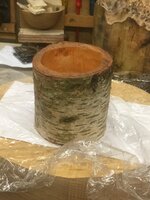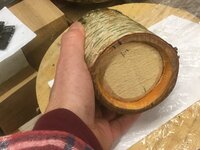You are using an out of date browser. It may not display this or other websites correctly.
You should upgrade or use an alternative browser.
You should upgrade or use an alternative browser.
Why hardwood instead of softwood?
Signed-In Members Don't See This Ad
Signed-In Members Don't See This Ad
jttheclockman
Member
Not true for all things. Depends on what you are making. Same goes for flat carpentry work. Several reasons for that.
By the way welcome to the forum. Maybe you would like to introduce yourself in our introductory forum and tell us a little about yourself and what you like to do. By the way we like photos here.
By the way welcome to the forum. Maybe you would like to introduce yourself in our introductory forum and tell us a little about yourself and what you like to do. By the way we like photos here.
carlmorrell
Member
Hardwoods are deciduous, and softwoods are conifers. It is a very deceptive term.
 www.diffen.com
www.diffen.com
Hardwood vs Softwood - Difference and Comparison | Diffen
What's the difference between Hardwood and Softwood? Classifying wood as either a hardwood or softwood comes down to its physical structure and makeup, and so it is overly simple to think of hardwoods as being hard and durable compared to soft and workable softwoods. This happens to be generally...
Charlie_W
Member
Wood is wood! Free wood is even better.....however, don't waste your time turning junk wood just because it is free.
Many woods are fine for turning and like JT said, it depends on the application.
Also, it also depends on what tool you are using and whether you are cutting and slicing the wood or scraping. Some woods are better than others when using scrapers.
Many woods are fine for turning and like JT said, it depends on the application.
Also, it also depends on what tool you are using and whether you are cutting and slicing the wood or scraping. Some woods are better than others when using scrapers.
howsitwork
Member
all depends what you want to do. I have a shrink pot made from wet sycamore and dry ash for the base . As the sycamore drys it shrinks onto the base making me a drinking mug.Ok I could just have turned the mug from dry sycamore or beech but I don't learn new techniques that way!
Would have reduced the number of stab wounds to my hands but again that teaches lessons on how (not) to hold it whilst hand hollowing with chip knives .
Welcome to the forum as well.

Would have reduced the number of stab wounds to my hands but again that teaches lessons on how (not) to hold it whilst hand hollowing with chip knives .
Welcome to the forum as well.


leehljp
Member Liaison
There are quite a few "soft" wood pens shown on this forum from years ago. Softwood and punky hardwood (in the stage of decay) are stabilized (hardened) and turn well.
There are softwood burls (again stabilized) that turn and look great too.
There are softwood burls (again stabilized) that turn and look great too.
MRDucks2
Member
I turned some cool looking preclude spindles from softwood off of a lawnmower shipping crate. The wood used had a lot of interspersed scale marks on it and eyes from small branch. It sanded to a wonderful smooth, silky finish.
The various trims in my house from 1893 use combinations of oak, walnut, poplar and pine. While I have tried to prove it yet, all of the subfloor sure make me think of either Western Red Cedar or Redwood.
Nothing wrong with softwoods or soft woods of any type but if using meddle bearing versions (not going to get into definitions) The resin potential adds a different level of character and challenges.
The various trims in my house from 1893 use combinations of oak, walnut, poplar and pine. While I have tried to prove it yet, all of the subfloor sure make me think of either Western Red Cedar or Redwood.
Nothing wrong with softwoods or soft woods of any type but if using meddle bearing versions (not going to get into definitions) The resin potential adds a different level of character and challenges.
Dieseldoc
Member
For pen hard wood gives one a better finish due to tight grain, as soft wood for the most part is open grain and has finish problems some time. That is why most soft wood used is stabilized.
howsitwork
Member
And remember technically YEW is a soft wood but it sure blunts tools quickly! Also Balsa is a hardwood , crazy but true.
PaulWitmer
Member
As mentioned, it depends on the application. I've turned both hardwood and softwoods and both have provided excellent turnings, including pens. Most softwoods have open grain, as mentioned in replies above, which at times can be a nuisance when finishing, but overall, I've had pretty good luck so far. I've turned pine and yew, both stabilized and not. I prefer the stabilized softwoods as they turn and finish much nicer, and if dyed, provide some spectacular effects in the turned product. I try to stay away from wood with a lot of sap in it, unless it gets stabilized.
Paul
Paul
